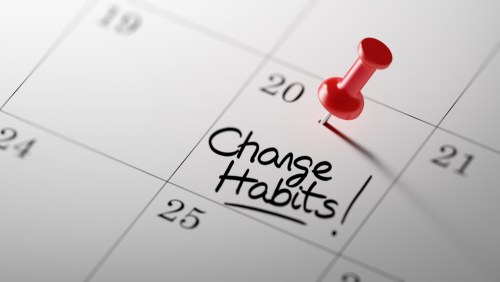Article by Hannah Prince
 Since transitioning into a different way of living during the COVID-19 crisis, you may have experienced changes to your behaviour and ways of thinking.
Since transitioning into a different way of living during the COVID-19 crisis, you may have experienced changes to your behaviour and ways of thinking.
I certainly have. I now don’t think twice before going for my morning meditation or getting up to stretch my legs when I have been at my desk for a while, because I know it makes me feel better physically and mentally.
I admit, at the start of lockdown I set out with a plan of behaviours I wanted to endorse – exercise and morning meditation before work, clear end to the day and clear space for working – but some behaviours I did not, like the morning coffee accompanied by biscuits, checking of emails out of my usual working hours, or the virtual family quizzes.
These regular behaviours or patterns of thought can quickly become habits without even realising it. Some may be beneficial for us (I have loved the virtual quizzes and we will continue as lockdown eases), some might not be (the biscuits – not so great for my waistline). It has taken reflection and conversation with my partner to become aware of this.
So are you aware of the habits you have formed in lockdown and how they may be affecting you? How can you make sure that you carry the helpful ones forward, whilst leaving the unhelpful ones behind?
What are habits?
Habits are not all bad. They allow our brains to free up processing capacities for other tasks. If we had to think about every single behaviour consciously, it wouldn’t allow room for anything else!
Charles Duhigg’s 3-step habit loop is particularly useful when looking to change habits. He argues that habits are made up of the cue (which triggers our behaviour), the routine (the behaviour) and reward (which motivates us to repeat the behaviour). Rehearsing these 3 steps over time creates a habit.
Develop awareness of habits
Before deciding whether to keep or change our habits, we first need to become aware of them: this requires mindful attention to our behaviours. At Insights we say that developing self-awareness is the foundation for any change, and it is no different for habits.
Consider any behaviours you have changed or started engaging in since lock down. It may be helpful to get input from someone else, or jot down your thoughts and behaviours throughout the day. You can then begin to build a picture as you look back over your notes.
It can be helpful to consider the effect of those thoughts or behaviours on you – you may intuitively know this, or it may take increased reflection. Note down how you are feeling, what physical sensations you experience – there may even be some tangible outcomes from those.
Changing habits
Once you have identified a habit that is having a negative impact on you that you would like to change (e.g. eating biscuits with coffee) it can be helpful to work through the 3-step habit loop. First, try to understand why you are engaging in that behaviour – what is the reward you are seeking? Am I eating a biscuit because I’m hungry or simply want social interaction?
To figure this out it can be useful to experiment with different behaviours which may deliver different rewards e.g. instead of going to the kitchen for a biscuit get an orange or go to speak to someone else away from the kitchen area. As you try these out, write down the first 3 things that come to mind and see if after 15 minutes you still have the urge to engage in the behaviour. If you do then you know you can eliminate that craving from the scenario. Keep going until you can identify the ‘why’ that is driving your behaviour. For me, it was the social interaction I was craving.
Next Duhigg suggests isolating the cue from the rest of the information we may have around us, so when the urge hits you, ask yourself where am I? What time is it? What emotions am I experiencing?
Who else is around? What was I doing before I felt the urge? This helps you to build a picture of the specific environment in which your behaviour takes place. Mine was at a set time of day in the morning, after being alone at my desk for a few hours.
Finally plan – your “implementation intentions.” Now you know the reward driving your behaviour and the cue triggering it, you can attempt to change your behaviour through a plan. For example, I will set an alarm for 11am, when I will find someone for a chat and a stroll. If this is not possible, how else can I get that interaction? It can be helpful to consider the process and not the end goal of this habit: for example I could imagine myself doing this, feeling more energised as I go and more focused as a result.
Challenge your mindset
When writing your plan, it is likely you will come up against some resistance through your internal dialogue. Try not to just ignore these thoughts, rather listen to the stories you are telling yourself – they tend to guide our beliefs about what we can and cannot do. They create the lens through which we see the world; a filtered lens which we do not have to buy into.
Top tips for changing unwanted habits
- Replace existing habits with new ones: it is more motivating to start a new behaviour than abruptly stop another with nothing to fall back on.
- Be specific and make it achievable: if you try to change everything at once it can be extremely demoralising.
- Make contingency plans for obstacles: those ‘what if’ plans
- Share with others your goals: make sure you are accountable to somebody.
- Practice, practice, practice!
- Celebrate small wins: even the slightest change is a step in the right direction.
 About the author
About the author
Hannah Prince is the Business Psychologist at Insights Learning & Development. She has a passion for understanding the underlying psychological factors required for high performance in professional contexts.
If you are a job seeker or someone looking to boost their career, then WeAreTheCity has thousands of free career-related articles. From interview tips, CV advice to training and working from home, you can find all our career advice articles here.







